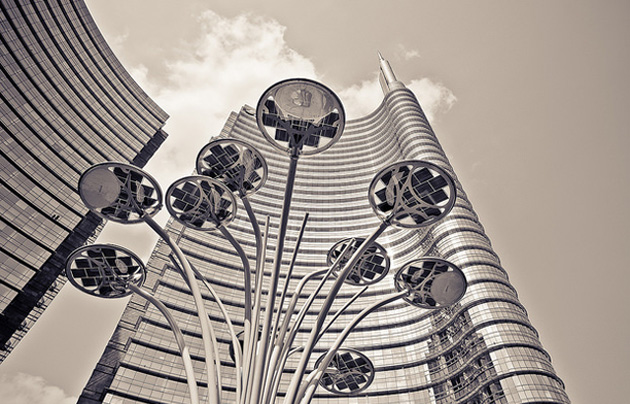The problem is particularly felt in Lombardy, due to a regional planning law, of 2005, commissioned by the Lega Nord, which prevents the use for purposes of worship of buildings that are not born with the intended use. There are already over a dozen places of worship forced to close.
 A view of Milan. / Lorenzoclick (Flickr, CC).
A view of Milan. / Lorenzoclick (Flickr, CC).
Even though in Italy we cannot speak of a persecution for religious reasons - it would diminish the suffering of those many Christians who in many countries of the world are truly persecuted for their faith - and yet we can say that in our country religious minorities continue to face discrimination and religious freedom is limited; and religious liberty is only theoretically granted by the Constitution.
Rather we should talk about freedom of worship in Italy, but not a full religious liberty. Namely, that minorities are free to gather, celebrate their rites, but when it comes to exercise their ministry outside the temples; to assist a parishioner in the hospital, or in prison; then it gets more complicated.
Another aspect is the non-application of Article 8 of the Constitution, which states an agreement between the State and religious minorities. That, as a matter of fact, significantly limits religious liberty.
Actually the first agreements have reached the goal of approval only after 36 years from the entry into force of the Italian Constitution of 1948, and after decades of battles by the religious communities involved. Other six agreements have been approved only recently.
Another crucial issue is the lack of access to public TV. While in fact, the Catholic Church, is ever present on state TV, the religious minorities are almost excluded from it, with only 1% of the space devoted to religious themes, available to them, which is widely consumed by three main religions, after the Roman Catholic Church: the Jews, the Italian Federation of the Evangelical Church (FCEI - Historical Protestant) and Islam, whose broadcasts are however aired late at night. Therefore what little the public knows of religious minorities is often partial, distorted and wrong, and it creates or maintains prejudices and clichés.
For years, we are waiting for a new law on religious liberty, which erase the old fascist law, of 1929, still in force for those who could not, or did not want to get the agreement as stated by the Article 8.
'Last but not least'; the State Council has recently set the minimum threshold of 500 the number of members of non-Catholics communities, to have the right to obtain the recognition of their ministers.
But there is also another big problem; the closure of many places of worship in northern Italy. The problem is particularly felt in Lombardy, due to a regional planning law, of 2005, commissioned by the Lega Nord, which prevents the use for purposes of worship of buildings that are not born with the intended use. There are already over a dozen places of worship forced to close. And at this point, not even the freedom of worship is granted, and not only religious liberty.
In their intentions, the lawmaker wanted to prevent the opening of Islamic mosques, but actually, the ones who are suffering the most for this law, are the evangelicals churches, and mainly those made by immigrants.
So at the end we can say is that in Italy we may have freedom of worship, but not a full religious liberty, until religious minorities will be not discriminated anymore.
Stefano Bogliolo is pastor, author and member of the Italian Evangelical Alliance board.

Las opiniones vertidas por nuestros colaboradores se realizan a nivel personal, pudiendo coincidir o no con la postura de la dirección de Protestante Digital.
Si quieres comentar o